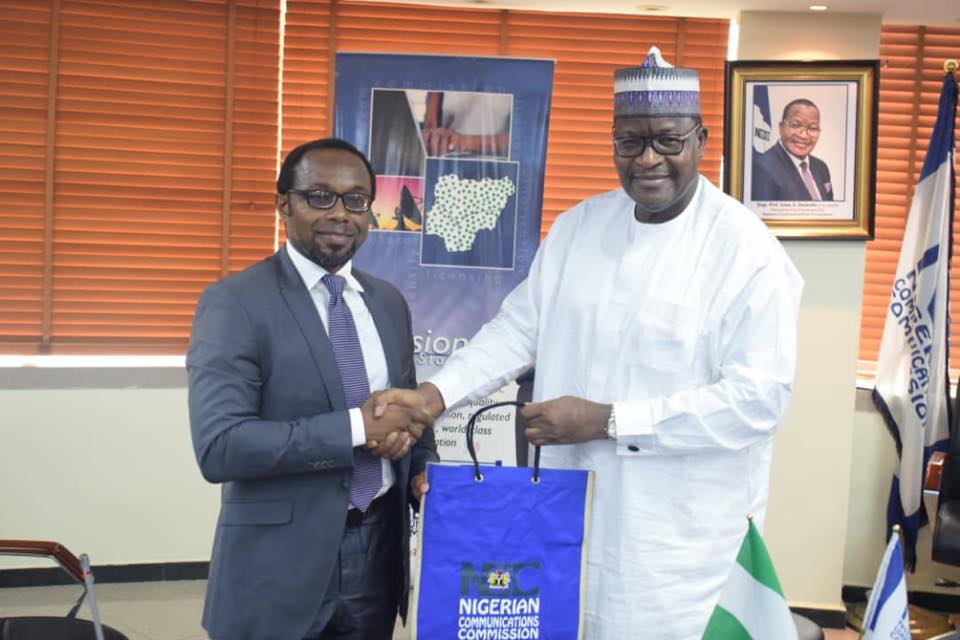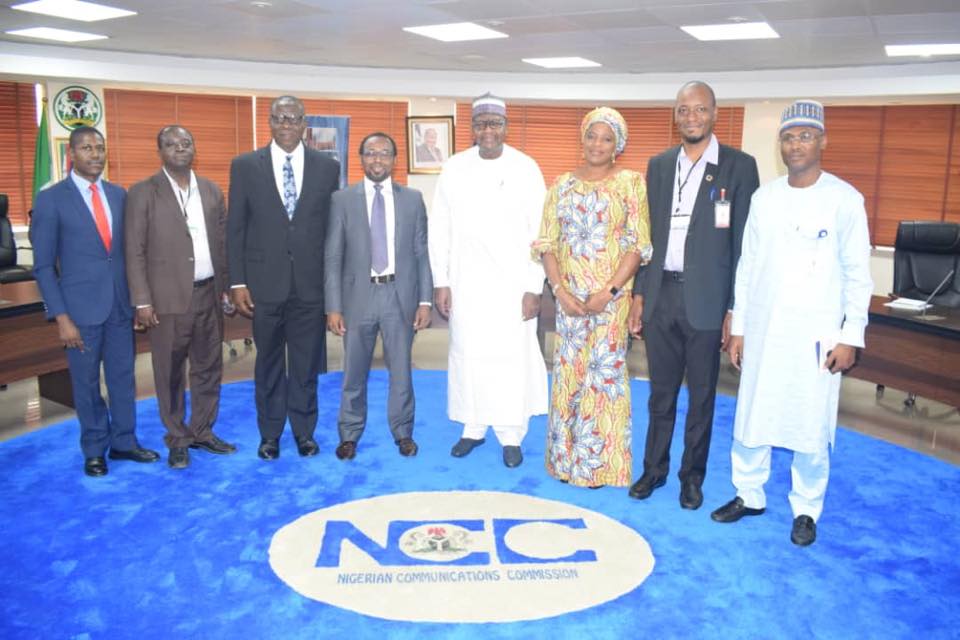The last part of ITPulse assessment of Prof. Umar Danbatta, the Executive Vice Chairman of the Nigerian Communications Commission (NCC) leadership in the last four years. Check out part 2 here, which was published two days ago.
Restoring quality of service delivery plus investors’ confidence
Under Prof. Danbatta’s watch, the Commission has stepped up stakeholder engagement and collaboration both within the private and public sectors of the economy to address salient issues affecting the industry and it continues to make remarkable inroads in this direction.
The Commission’s timely interventions in Ogun, Kano and Kogi States among others, to resolve cases of indiscriminate shutdown of telecoms sites by state agencies over disputed taxes and levies are worthy of highlighting. In Kogi State, for instance, more than 70 base stations were sealed by the Kogi Inland Revenue Service (KIRS) in 2018. Going by the nature of telecommunications service, which relies on 24/7 availability, each time base stations are shut or sealed by state agencies, site maintenance becomes difficult resulting in poor service experience by the telecoms consumers.

It is instructive to note that a similar intervention by the Commission, in collaboration with the Central Bank of Nigeria (CBN), helped to save 9mobile from the brink of collapse following a financial crisis involving a $1.2 billion syndicated loan obtained by the telco from a consortium of 13 banks. The landmark intervention has given the hitherto troubled telco a new lease of life and, as confirmed by Mr. Stephane Beuvelet, Ag. Managing Director of 9mobile during a recent visit of the board and management of the telecoms company to the Commission in Abuja, the telco has regained its growth momentum.
“As a Commission, we will continue to seek the understanding of the state governments and their agencies; and dialogue with necessary stakeholders to make our industry more attractive to investors. We are working to address challenges facing the industry and most importantly in the area of achieving a more friendly and enabling operating environment for faster telecoms infrastructure deployment. Only through this, can we have improved Quality of Service (QoS) that will automatically translate to an improved Quality of Experience (QoE) for the over 172 million telecoms consumers in the country as well as sustain the confidence of investors in the telecom industry,” said Danbatta in a chat with Journalists in Lagos.
He added further that, “the industry, having achieved over $70 billion investment, requires even greater infrastructure investment to achieve better digital transformation for our nation. To this end, all hands must be on deck. We need to understand the critical role access to telecoms services play in all the facets of our economy and we must work together to support the industry’s sustainability through improved quality of service and quality of experience for the consumers.”
Boosting competition among licensees
Under Danbatta, the Commission has demonsterated its awareness that competition is a global trend, and conscious of this fact, it has entrenched competition in the system. One of the initiatives include the engagement of KPMG Professional Services to conduct a Study on the Assessment of the Level of Competition in the Nigerian Telecommunications Industry. Today, competition has led to optimal performance from the different service providers because there is always that pressure from the insatiable consumers.

Ensure Regulatory Excellence
This is one of the NCC’s mandates you cannot nicodemously take away from them. They have so far done well with Danbatta piloting the ship. All the successes recorded so far in the Nigerian telecom sector can be attributed to the regulatory prowess of the Commission. Today, its role as the telecom industry watchdog has been able to stamp out monopoly through healthy competition and protection of interests of both service providers cum investors and subscribers simultaneously.
No wonder, local and international awards have come the way of the Commission in droves. In one of his interactions with Journalists, Danbatta had said: “It is our commitment to leverage on the best regulatory approaches to optimise the development of the Nigeria’s telecom sector, having known how critical the sector is to other sectors of the economy.”
Robust Stakeholder engagement
No week passes without the NCC, under Danbatta leadership, engaging with one group or the other across the country. This, the Commission considered important because of the daunting tasks and challenges in the industry and has had consultations with stakeholders as critical success factor in its regulatory mandate. The approach of consultations with stakeholders had yielded enormous positive results.
For instance, apart from the monthly Telecom Consumers Parliament, the Commission has always engaged the Governors forum, collectively and individually, to address some of the challenges, in the areas of multiple taxation, regulations and Right of Way. These engagements, no doubts, have seen to the development of effective partnerships with relevant stakeholders, thereby fostering ICT for sustainable economic development and social advancement.
Telcos’ listing on NSE
The credit for the listing of MTN Nigeria on the Nigerian Stock Exchange (NSE) this year also goes to the Danbatta-led Commission. The listing was one of the positive results of a ‘no-nonsense’, outstanding and effective regulatory effort of the Commission. The listing of MTN has, thus, served as tonic to other telcos to follow in the same direction such as the listing of Airtel.
As the country’s independent telecoms regulatory authority, the NCC essentially facilitated the landmark listing of the country’s largest telecommunications operator on NSE in line with its regulatory activities as enshrined in the Nigerian Communications Act (2003) and other subsidiary regulations to promote investment, create a level-playing field for all licensees, ensure compliance to existing telecoms laws and facilitate delivery of top-notch quality of services (QoS) to the consumers.
Suffice to say that through this smart regulation and intervention by the NCC, leading to the listing of MTN on the NSE, the Commission has opened another chapter in the history of telecommunication industry by empowering Nigerians to control, own and manage one of dominant telecommunications companies in the country by owning shares in MTN Nigeria.
“The MTN listing has helped to translate into action, an important objective of the Commission, which is to promote local investment and ownership in the telecom sector. Also, with MTN shares available in the capital market, it is expected that Nigerians will buy shares and by purchasing the shares of MTN, they will be financially empowered and be socially transformed,” The EVC said at a forum.

Speaking further, Danbatta said “It is instructive to state here that one of the greatest advantages of the MTN listing, facilitated by the NCC, is the implication it has on opening up the telecommunications industry for greater investment profile it gives Nigerians the opportunities to invest in publicly-quoted companies like MTN, which is the leader in the telecommunications industry in the country and easily one of the continental leaders.
“In addition to benefits to the consumers, we all know that telecoms is a capital-intensive industry and of late, we found out that the inflow of Foreign Direct Investment (FDI) into the sector has not been as much as it used to be and there is so much for the telcos to still do in terms of expansion and this expansion requires capital. Industry issue bordering on poor quality of service is being partly traced to lack of sufficient infrastructure covering the entire country.
“One of the benefits of MTN listing and those of other operators to follow, therefore, is that the telco would be able to raise capital for expansion which, in turn, will bring about an improvement in the quality of service and quality of experience for the consumers of telecoms services, which is also a cardinal function of the Commission.”
Danbatta and new Projections
Meanwhile, Danbatta has, among others, projected greater prospects ahead for the industry, especially in the area of broadband penetration to accelerate the transformation of Nigeria into a truly knowledge and digital economy.
According to Prof. Danbatta, the Commission has profound determination to see that all new sites to be built by the mobile network operators (MNOs) are LTE-compatible; the implementation of the harmonised RoW charges on state and federal government highways at the cost of N145 per linear meter; elimination of multiple taxation and regulations; spread of 3G coverage to, al lest, 80 per cent of the Nigerian population over the current 56.4 per cent of the population covered with 3G networks.
Other projections by the EVC of NCC include the upgrade of 2G base transceiver stations to 3G; spread of Fifth Generation (5G) to, at least, five per cent of the population; spread of 4G/LTE services to 100 per cent of the population with a minimum broadband speed of 1.5 megabit per second (Mbps); and finally deployment of, at least, on Access Point of fiber with a 10 gigabyte per second (Gbps) capacity in all the 774 local government areas, among others.
Commitment despite challanges
Following the ongoing implementation of various initiatives and projects designed by the Commission and in spite of industry challenges raging from the problem of right of way (RoW), multiple taxation and regulations, vandalism, paucity of forex, poor electricity, among others, the Danbatta-led Commission has apparently remained committed to ensuring that broadband continues to completely transform all the sectors of the Nigerian economy for greater protects.
ITPulse’s Verdict on the 4-year Prof. Danbatta
In view of the foregoing assessment, ITPulse can comfortably confirm that since becoming the EVC/CEO of the Commission in August 4, 2015, the Professor of Telecommunications Engineering at the helms of affairs of steering the nation’s telecommunications regulatory agency, despite daunting challenges in the industry, has brought forth his sound experience in piloting the affairs of the industry with such a finesse, ingenuity, regulatory excellence and passion.
To this end, Danbatta has remarkably consolidated on the growth recorded by his predecessors through effective development and driving of initiatives, needed to leapfrog the nation into a fully digital economy and there are high expectations that he is committed to do more with his formidable team of experts at NCC in the coming years.




